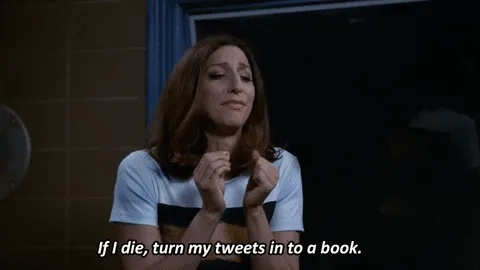What’s next for organic Twitter?
Some brands seem to be taking a wait-and-see approach as the platform’s future remains in the air.

Brooklyn Nine-Nine/Fox via Giphy
• 4 min read
Affiliate marketing has grown up. The new report from impact.com breaks down the five pillars of partner sophistication, shows how top teams measure creator performance with precision, and explains what actually drives revenue beyond the first click. Read the report.
The time period since Elon Musk bought Twitter has been…something. Since late October, he’s laid off thousands of employees, allegedly converted office space into bedrooms in potential violation of the law, banned and unbanned the accounts of several prominent journalists from the platform, and polled Twitter users to ask if he should step down as CEO—among other things.
As all that’s been happening, brands have pulled or paused their ad spend, some likely at the recommendation of their agencies. But as the platform where brands like Wendy’s and Taco Bell became known for their social prowess potentially combusts, how have brands’ organic strategies shifted?
According to new data from software company Emplifi, “there has been a dip in organic brand posting behavior for US and Canadian brands on Twitter” in 2022, with the biggest drop coming at the end of November after Musk took over. Its analysis of more than 2,300 American and Canadian brand accounts, ranging from Starbucks to Whole Foods to McDonald’s, found that while nearly 80% were tweeting at least weekly during mid-October, only around 60% were doing so in early November.
Emplifi’s findings indicate the biggest drop in organic posting occurred in late November, following Musk’s tweet of a graphic image.
Emplifi
Kyle Wong, chief strategy officer at Emplifi, told us he believes that more US and Canadian brand accounts appear to have paused their activity than those in the rest of the world because discussions around hate speech on the platform “have to do with hate speech…in the United States” and therefore likely hit “closer to home.” Earlier this month, the New York Times reported that the rise in hate speech on the platform after Musk took over was “atypically high,” according to researchers.
If things continue to go in this direction, questions remain about what will happen to corporate accounts that have become integral to certain brands. Based on Emplifi data, Wong said that Burger King, Wendy’s, McDonald’s, Taco Bell, and Arby’s collectively posted 60% less in the month of November (12k) versus their collective monthly average (29k).
More specifically, Emplifi data shows that @McDonalds had a 72% decrease in tweets posted from October to November, going from 219 to 61 tweets. Other brand accounts like @subaru_usa and @Target decreased posting by 98% (from 108 to two) and 94% (from 35 to two), respectively.
“Twitter has been a really great place to establish your brand voice and tone,” Mike Lee, strategy director at creative agency VSA Partners who works in establishing brand identity, told us. “You should expect to find a sample tweet now in a brand book because it’s become that ubiquitous.”
He said brands should start thinking about the next platform they could engage in, noting that Taco Bell is one brand that “seamlessly moved into TikTok” and connected with customers there.
But Lee noted it’s also important to focus on creating one-to-one engagement with consumers outside of social media. “Brands are realizing, ‘Oh, I don’t own that relationship…That relationship is owned by the social platform,’” he said.
“For some brands that might happen through loyalty programs, for some brands that might be through their app, for some brands that might be building out their ECRM [electronic customer relationship management] in a better way,” he said. “It’s critical for brands to constantly be thinking, ‘How are we building and strengthening our relationships with our consumers directly?’”
In fact, customer relations seems to be one place where companies are still tweeting as usual these days. Because Twitter is “very hard to replicate on other platforms,” especially the ability for brands to directly respond to and ask customers questions, Wong said, noting that accounts made specifically for customer support have not appeared to pause activity at the same rate as other corporate accounts.
In the meantime, it seems many brands are waiting to see what happens next with Musk, if Twitter goes the way of social sites past like MySpace and something replaces it, or if this is all just a blip in internet history. As Wong told us, “Just because [brands] paused doesn’t mean they have left the platform forever. So we’ll see what happens.”
Get marketing news you'll actually want to read
Marketing Brew informs marketing pros of the latest on brand strategy, social media, and ad tech via our weekday newsletter, virtual events, marketing conferences, and digital guides.
